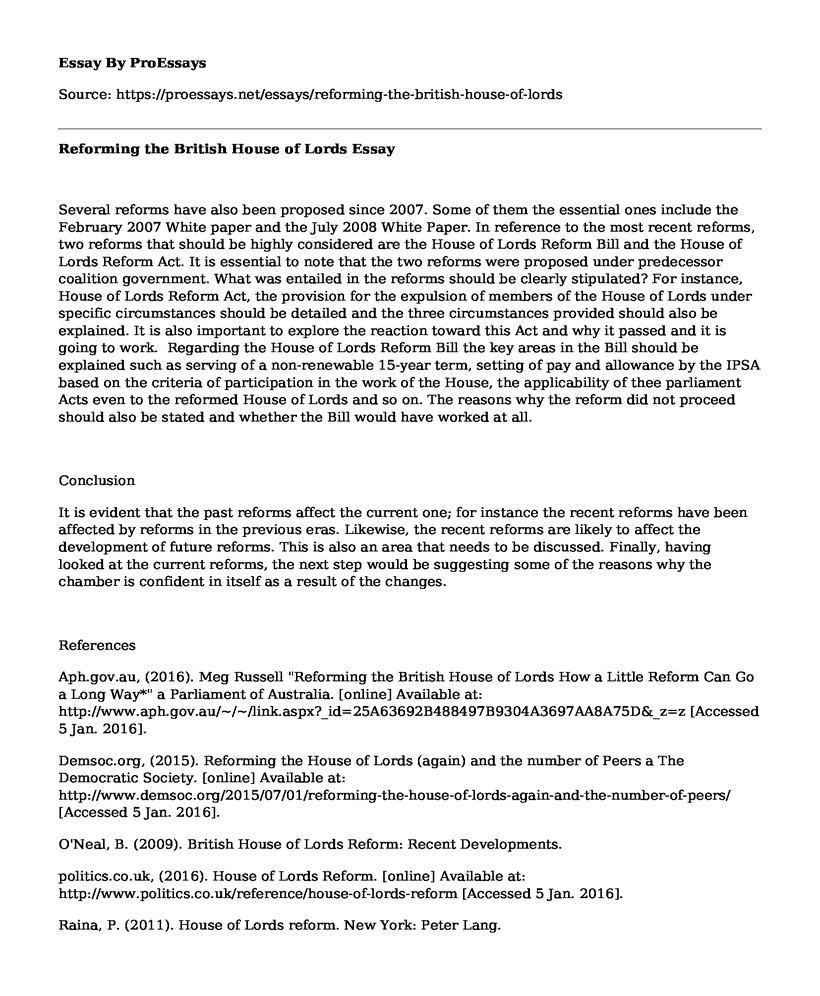Several reforms have also been proposed since 2007. Some of them the essential ones include the February 2007 White paper and the July 2008 White Paper. In reference to the most recent reforms, two reforms that should be highly considered are the House of Lords Reform Bill and the House of Lords Reform Act. It is essential to note that the two reforms were proposed under predecessor coalition government. What was entailed in the reforms should be clearly stipulated? For instance, House of Lords Reform Act, the provision for the expulsion of members of the House of Lords under specific circumstances should be detailed and the three circumstances provided should also be explained. It is also important to explore the reaction toward this Act and why it passed and it is going to work. Regarding the House of Lords Reform Bill the key areas in the Bill should be explained such as serving of a non-renewable 15-year term, setting of pay and allowance by the IPSA based on the criteria of participation in the work of the House, the applicability of thee parliament Acts even to the reformed House of Lords and so on. The reasons why the reform did not proceed should also be stated and whether the Bill would have worked at all.
Conclusion
It is evident that the past reforms affect the current one; for instance the recent reforms have been affected by reforms in the previous eras. Likewise, the recent reforms are likely to affect the development of future reforms. This is also an area that needs to be discussed. Finally, having looked at the current reforms, the next step would be suggesting some of the reasons why the chamber is confident in itself as a result of the changes.
References
Aph.gov.au, (2016). Meg Russell "Reforming the British House of Lords How a Little Reform Can Go a Long Way*" a Parliament of Australia. [online] Available at: http://www.aph.gov.au/~/~/link.aspx?_id=25A63692B488497B9304A3697AA8A75D&_z=z [Accessed 5 Jan. 2016].
Demsoc.org, (2015). Reforming the House of Lords (again) and the number of Peers a The Democratic Society. [online] Available at: http://www.demsoc.org/2015/07/01/reforming-the-house-of-lords-again-and-the-number-of-peers/ [Accessed 5 Jan. 2016].
O'Neal, B. (2009). British House of Lords Reform: Recent Developments.
politics.co.uk, (2016). House of Lords Reform. [online] Available at: http://www.politics.co.uk/reference/house-of-lords-reform [Accessed 5 Jan. 2016].
Raina, P. (2011). House of Lords reform. New York: Peter Lang.
Researchbriefings.parliament.uk, (2016). Research Briefings - House of Lords Reform Bill 2012-13: decision not to proceed. [online] Available at: http://researchbriefings.parliament.uk/ResearchBriefing/Summary/SN06405 [Accessed 5 Jan. 2016].
Services.parliament.uk, (2016). House of Lords Reform Bill 2012-13 a UK Parliament. [online] Available at: http://services.parliament.uk/bills/2012-13/houseoflordsreform.html [Accessed 5 Jan. 2016].
UK Parliament, (2016). House of Lords. [online] Available at: http://www.parliament.uk/business/lords/ [Accessed 5 Jan. 2016].
Cite this page
Reforming the British House of Lords. (2021, Mar 03). Retrieved from https://proessays.net/essays/reforming-the-british-house-of-lords
If you are the original author of this essay and no longer wish to have it published on the ProEssays website, please click below to request its removal:
- The Role of the Federal Government in Health Care
- Business Essay Example: Gold Gyms Overview and SWOT Analysis
- Function of Government in the Cases of Tragedy of Commons Essay
- Features of Community Policy Paper Example
- Essay Sample on Denuclearization
- Essay Sample on Types of Interviews: Formal, Informal, Structured & Unstructured
- Essay Example on Decolonization and Cold War: The New Phase of Imperialism







